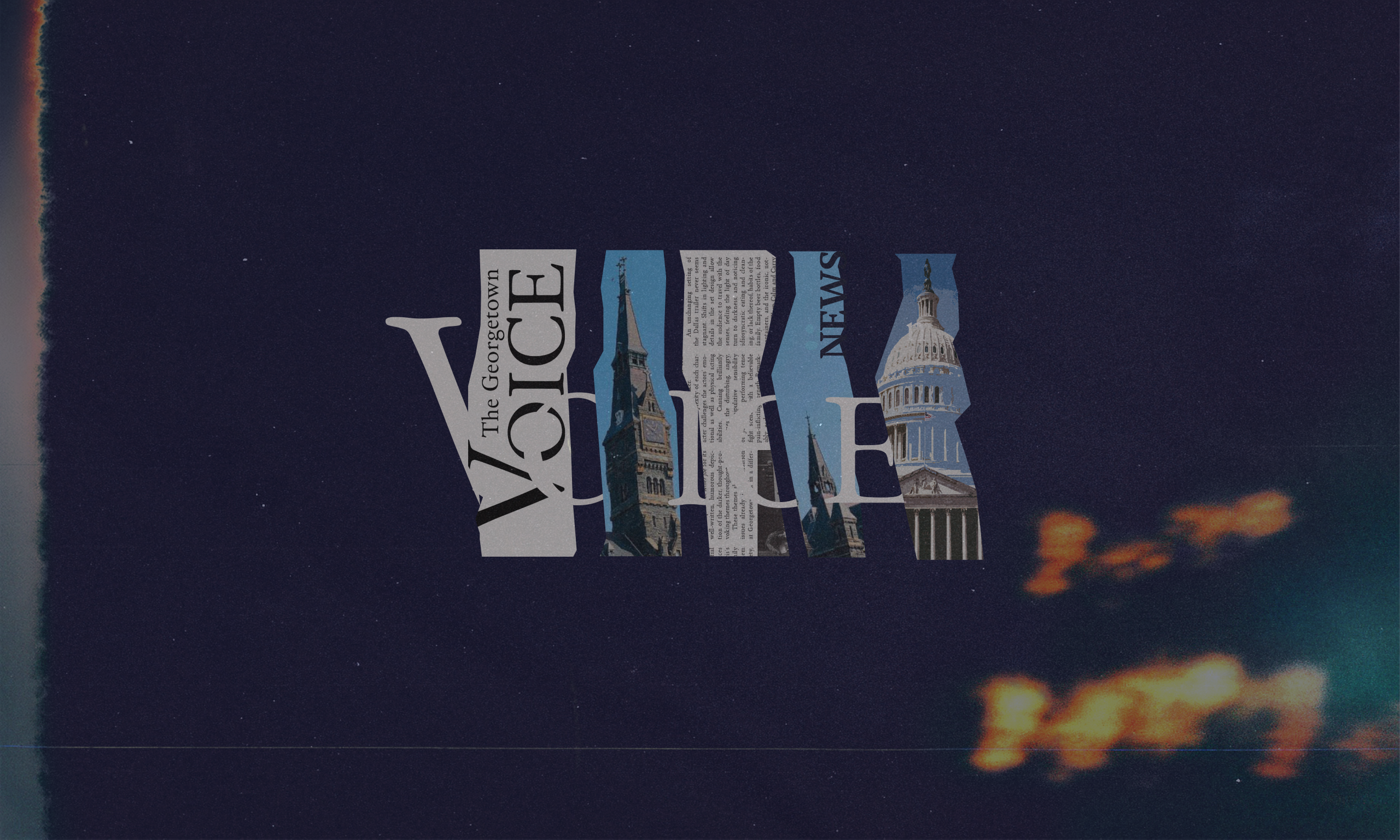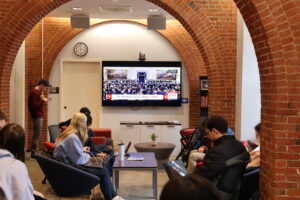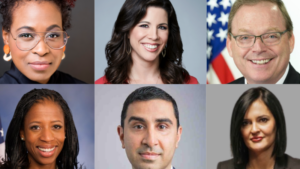The Georgetown Institute of Politics and Public Service’s new class of fellows for the spring semester, with six experts each distinguished in their respective political field, will work alongside Georgetown students in small teams to research and discuss specific topics ranging from political organization to media in a post-Trump era.
The class includes high-profile political players such as former Senator Doug Jones (D-AL) and Tom Perez, the most recent DNC chair and Obama´s former Secretary of Labor. The list also features media and campaign experts, like Julie Pace, the Washington Bureau Chief for the Associated Press, Sara Sendek, the former Director of Public Affairs at the Cybersecurity and Infrastructure Security Agency, Guy Benson, the political director at Townhall and a Fox News contributor, and Anatole Jenkins, the former national director of state organization for the Biden-Harris campaign.
During an online press event with campus media on Jan. 29, the fellows answered questions centering on social justice, leadership, and bipartisanship as America enters a new administration.
What is the objective of your discussion group and something that you hope students would take away from participating in your discussion group?
Jenkins: The subject of my discussion is organizing in 2020, organizing during a pandemic, and lessons for the road ahead – not just the road ahead in terms of our electoral fights that we have, in terms of the fights we need to do as a party to make sure we keep control of the House and expand control of the United States Senate, and the host of other legislative and elected seats across the country, and in addition social movement fights and folks who are going to be working on the outside to push the folks working on the inside to make the change we need.
Pace: My discussion group is going to focus on media in the post Trump era. It’s great to start off by talking to some student journalists here because you guys are so crucial to what that all looks like. I think that, for the media, the Trump era has been both a blessing and a curse. It was good for business, we certainly saw readership go up. I think a lot of outlets did some of the best journalism that they’d done in years. But I think in some ways it also played to some of the worst instincts of the media, and I think we saw a veer from some of the more traditional mainstream outlets into a little bit of opinion. I think we saw a lot more of the ideological split in the media become clearer. One of the things I want to talk with my group about is how the media moves forward, how we gain trust with the public, how we focus on not just putting forward opinion but putting facts first, particularly given how much disinformation is out there.
Jones: My discussion groups will be on something I feel very strongly about and that I have worked on for a lot of my professional career and in the Senate, and that is trying to right the wrongs, create justice where injustices exist by bridging divides. Our discussion groups will focus on how we got here, where we are. I think since January six it’s actually gotten worse than it’s gotten better, you read some of the things going on today. We’re going to be looking at both across the board and will look at the injustices in the connection between the injustices in society and the divides that we have in this society, how we can bridge those divides and try to ameliorate the injustices that exist. We’re gonna be looking at – across the board – racial injustices and racial divides I think permeate in our entire society. We’re going to be looking at that, as a backdrop but also look at how all of the divides affect healthcare delivery economy, the jobs, and of course partisanship, and where we stand in Congress and legislators across the country these days so I’m really looking forward to trying to work with that and getting young people’s perspectives on this.
Perez: One of our goals in our study group is going to be introducing you to problem solving at a federal level, state level, local level. We’ll talk about the democratic primary and how we manage the campaign with an unprecedented number of candidates and how we got through that and how we were able to achieve a necessary unity that helped us to win. At the same time, when you’re in Washington DC there’s a tendency to think that the center of the universe is four miles away from the Georgetown campus. My goal at the end of the term is I want people who have an understandable cynicism about our politics right now, because our politics are broken. I want people to not have that cynicism and to understand that, even in these seemingly dark moments, there are remarkable opportunities to make a difference and to use local government. state government, federal government, the DNC, the RNC, to use tools for the public good.
Sendek: My discussion this semester will be titled, “Democracy, Dissent, and Disinformation.” I think we all saw recently this month what effects disinformation can have on our democracy. It’s a huge problem. I don’t know what the solution is but I’m really looking forward to digging into it and discussing what can be done and what steps everyone can take to make sure that this doesn’t happen again.
Benson: My discussion focus is going to be really where the conservative movement and the Republican Party go from here. The last five years were dominated by one person. I think news coverage of politics was dominated by one person, and I’m not really sure the party knows what’s next. Yet, as someone who is a conservative and interacts with a conservative audience and interacts with a lot of Republican lawmakers and strategists on my show and various other platforms, it doesn’t really feel like the party is even in the ballpark of a healthy place right now, despite some of the electoral gains or not so horrible losses. I think that initially, the conversation was going to be okay, what does this look like in the post-Trump era I think part of the discussion here is going to be whether or not it is the post-Trump era.
Following the events of Jan. 6 and recent polling evidence that suggests the country is more divided than it has been since 1947, what direction do you see bipartisanship headed as we enter a new administration?
Perez: I mean the President has been very clear. He was clear at the outset of his campaign – his campaign was for the soul of the nation. He has pledged and is working tirelessly to bring the nation together; whether that happens remains to be seen. I would hope in the aftermath of an insurrection that we saw you know where you turn the US Capitol into a crime scene. I hope that that will force people – at least enough people – to take a step back and ask some very serious questions about our democracy. right now. There’s a lot of the folks who are advocating and interacting with people in some of these really far right movements – again, movements that were on our radar screen 25 years ago and some that are just newly emerging. You have some of these folks their districts are so heavily gerrymandered that their main concern is a challenge from their right; some folks who are Democrats, their main concern is a challenge from their left.
Jenkins: And just talking about speaking from an organizing perspective on you know, it’s interesting or it’s not interesting that the Biden-Harris campaign, the ticket, had the broadest coalition of support just from the top level. This was the first time that we had a significant portion of folks who were mobilized and activated who were not registered with the Democratic Party. I think it tells you that they weren’t necessarily mobilized to be a part of the Democratic Party, but they were mobilized via the issues that we were talking about. It’s something that we have to figure out how to solve, is how do we keep those folks mobilized and engaged, not necessarily with the Democratic Party, but more importantly, probably, with their local and in their local communities, talking to their neighbors and sort of taking the partisan lens out of it and bring it back to a community level.
Benson: I do suspect that some of the right-leaning or centrist people who are mobilizing for the Biden campaign were doing so based on one issue – named Donald Trump. I think now that he’s no longer President it’s going to be interesting to see how the Democrats decide to govern.
Pace: I do think one of the realities that we kind of have to grapple with as a country here is that what we saw on the sixth was the manifestation of a lot of forces that have been bubbling up around this country for a long time and Trump may have exacerbated some of them, and he may have created sort of a permission structure for them, but it’s not as though in four or six months, if Joe Biden manages to get some Republican votes on a COVID package, or if he looks like he’s gonna bring Republicans over the White House to have some negotiations that that does anything to address what’s happening in the country. Out in the country right now, we are seeing a split happening that is not traditional red and blue. It’s about a lot more than that.
Sendek: And I think one of the major challenges with that split is now, more than ever, Americans have increasing options of where to go, so that they can just hear their own echo chamber, whether or not it’s on social media or news channels. They have this ability to only hear the side they want to hear and not hear anything else, and I think that’s going to be one of the biggest challenges we’re facing.
Jones: I also would say a lot of this is really going to depend on the character of those people running for office and those people holding office. If they want to work to get things accomplished, then they can do it, but it also is going to mean that they can’t work from one election to the next. People have to start looking at what we can do, what we are facing right now in this country, and the problems that we’ve got and how can we solve them and let the election, you know, let the chips fall where they may on the election, because unfortunately people in the country – they talk about unity and they talk about bipartisanship but they damn sure don’t always vote that way.
What initially motivated you to become involved in politics, and what makes you stay involved?
Jenkins: Well, for me, for me it was representation. I view it being very lucky, having come of age like political students during the 2007-2008 primary, where you have a black man like Barack Obama and a woman, Hillary Clinton sort of leading the charge. Before that I don’t think that I knew that this was an option for me, and that is very much why I also stay involved and stay engaged. I think it’s important for folks to see themselves represented and people who are actually making decisions and opening those doors for more people to come in.
Jones: All right, I got involved, like everybody else at a young age. I was enthralled with politics, so heroes in John F Kennedy and Robert F. Kennedy and others. I saw villains in my state like George Wallace and Bull Connor and I wanted to get involved to help try to make a change. Politics is really about public service, and that you really have an opportunity to make a difference in your communities, your state, and your country, by doing the right things, and that is what motivated me in 2017.
Perez: My family came to this country because of politics. My family’s from the Dominican Republic. My mother’s family got kicked out because of an authoritarian dictator and my grandfather speaking out against him – a guy named Trujillo, who was a thug. My father had to leave for similar reasons. This country gave my family hope. Even in these dark moments I think there’s so much opportunity to make a difference and I think part of what motivates all six of us to be excited about being part of the Georgetown family this term is these grown-ups kind of mess this thing up and we’re looking to you for guidance. I still believe, on the darkest nights you see the brightest stars and that’s what my parents always taught me to make sure you’re continuing to fight and that’s what motivated me.
Benson: I started following politics as a class assignment in middle school. There was a presidential election that we had to figure out, you know, who you’re supporting and why, and we had sort of mock campaigns and that sort of thing. It appealed to me because I was and am a huge sports fan, and I sort of viewed politics at the beginning, as kind of like another fun high stakes team sport, where you pick a team you root for them, you boo the other team, and you know and so forth. Then my junior year of high school was 9/11, and I grew up in the New York area. My town lost 12 people in the World Trade Center that morning. My father worked in lower Manhattan and we didn’t know where he was for a while. That was sort of a turning point for me where I started to think a lot harder about why politics matters, policy matters, that people who are in charge in moments of crisis matter, and that’s when I started to take it more seriously and I’ve had some interesting twists and turns along the way ideologically and so on and so forth, but it started as sort of a fun interest turned into something a little bit more serious and then, in some respects, you know, a career.
Pace: I had no intention of ever being involved in covering politics at all. My goal was to be a foreign correspondent. I freelanced in Southern Africa after I graduated from college and ran out of money and needed a job. I got this job covering politics in Florida, and then I got a job covering politics at the AP in Washington and thought, ‘That’s my ticket to get back overseas.’
The assignment they gave me was the 2007-2008 campaign and I spent a lot of time covering Obama on the road, and I just got hooked by it. One of the things I think that is so interesting is everyone sort of has like a moment where you’re like, ‘Oh, that’s when I latched on to this,’ and, for me, what was so cool about that campaign – not ideologically, but was seeing young people. At the time I was young, and so people my age, you know getting involved in politics for the first time and seeing power and getting involved and seeing their ability to shape the forces in this country and and that, frankly, is what really hooked me on it and then from there, it just grew.
Sendek: I think, for me, it was very much a public service thing. It was a way to get involved and actually feel like I was giving back to my country. I’m trying to make things better. I don’t know that we’ve done it right over the past 15 years but I’ve worked for some great people that I know have put everything into this effort and have maybe not done it right all the time, but have done it because they think it’s the best thing to do. Politics can get ugly. There’s some not great people in it, but when you get to work for some of the best people that you know are just here to serve their country it’s really inspiring and has made me want to stay in it and be part of it.
Some interview responses have been slightly edited for the sake of length






